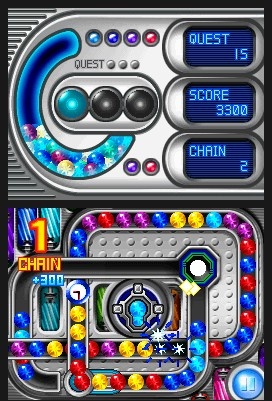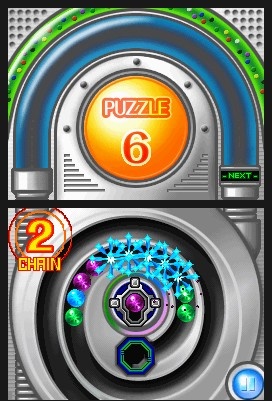Say the words Puzz Loop to all but the most serious obscure puzzle game fans, and you'll likely get a blank stare in return. Say the word Zuma to just about anybody with any sort of penchant for puzzles, and immediately the lights will snap on. Perhaps that's because Puzz Loop, despite being the originator of the same puzzle formula both games use, never caught on in North America, and only years after that game's release did Zuma come along to usurp the concept and popularize it over here. Magnetica for the Nintendo DS is Puzz Loop, or Zuma, or whatever you want to call it. It adds in touch-screen controls and a few twists on the formula to effectively call it an update, and ultimately it's a fun little puzzle game that just so happens to reside on a system rich with good puzzle games. In comparison to what else is out there, it comes across as rather ordinary.

For those with no prior knowledge of Magnetica, Puzz Loop, Zuma, or any other silly name for the same game, the way in which the game works is that you are presented with an ever-growing string of colored balls moving perilously toward the center of a loop. You must then use a launcher of like-colored balls to break up the string in sections of three and send the string moving backward. Combos can be enacted by hitting multiple strings in a row, which nets you big points and takes off large chunks of the string. All balls of the same color are magnetically attracted to one another, and if you're left with a big hole between one section of the string and another, you can shoot a ball of a similar color to the one on the end of the string closest to the center to send the string shooting back a good distance. There are also some power-ups that blow up all the balls of a single color, slow down or stop time temporarily, and the like.
It's a simple but effective formula that's served Zuma well over the years and works just about as well in Magnetica. Functionally this is very much the same game as Zuma and Puzz Loop but shrunk down into easily playable handheld form. One quirk specific to the DS is the use of the touch screen to fire off balls. Rather than use the traditional arrow-based pointer to target your balls, you simply use the stylus to flick a ball in the desired direction. It's not quite as precise a method as you would get with the pointer, but generally the touch-screen controls feel about right, and if you're careful, you won't find yourself with too many frustrating misses.
But while the game uses a winning concept, after a while it's hard not to feel a bit worn down by it. It's not that there's a lack of content to keep you interested, mind you. The game offers three distinct single-player modes, including a challenge mode that tasks you with getting through as many of 99 levels as you can in one single shot; a quest mode that includes 60 different puzzles, all of an entirely different shape and variety; and a puzzle mode, which eschews the typical time-based methodology and gives you an extremely limited number of balls, forcing you to think carefully about where you shoot, because if you're left with any balls on the field after you've run out, it's game over. There's also a multiplayer mode for up to two players where you and a friend can battle it out via multicard or download play.

That sounds like an excellent array of modes, but it all just sort of blends together after a while. The gameplay stays sharp throughout, and the challenge is most certainly there, but something about the game's layout and content just isn't compelling for terribly long. It's good in short bursts, but if you find yourself playing for any lengthy stretches, you'll burn out on it quickly. Also, the multiplayer just isn't that great. The rub there is that by pulling off combos on your screen, you send colorless ball bearings over to your opponent to screw up their strings. It's a reasonable setup, but you can't see your opponent's screen to know how much damage you have or haven't done, and you get zero feedback on how you're doing comparatively (except, perhaps, for the flustered cursing of your opponent when he or she is losing). There's also not much to the game's presentation. The game is appropriately colorful, if a bit repetitive looking with its use of the metallic, pseudofuturistic motif. The audio consists mostly of generic but enjoyable tunes that play in the background, and little bleeps and bloops here and there.
Most of these problems would be easily forgivable if Magnetica weren't a full-priced DS game. Superior DS puzzle games such as Meteos, Tetris DS, and even Zoo Keeper can be purchased for less than the $34.99 Magnetica costs at retail. That's not to say that you shouldn't play Magnetica, as it contains plenty of puzzles and it's nice to have a version of the game on the go (assuming you don't already have Zuma on your mobile phone). It's a good puzzle game that has its addictive qualities--it just shouldn't be your first or even your second choice for such a game on the DS.